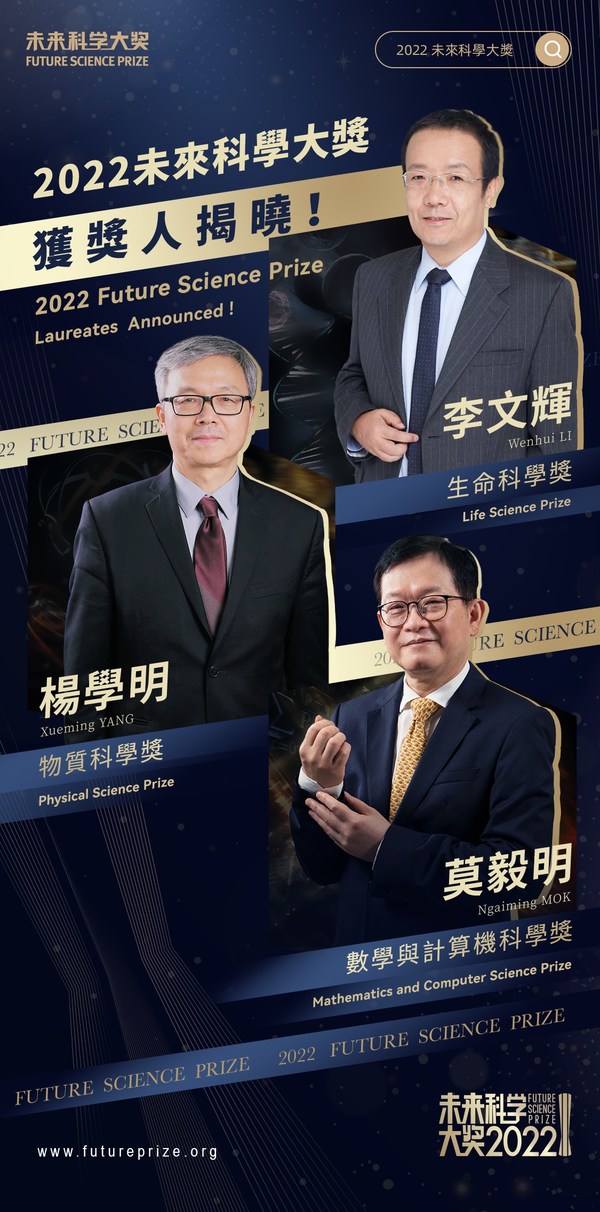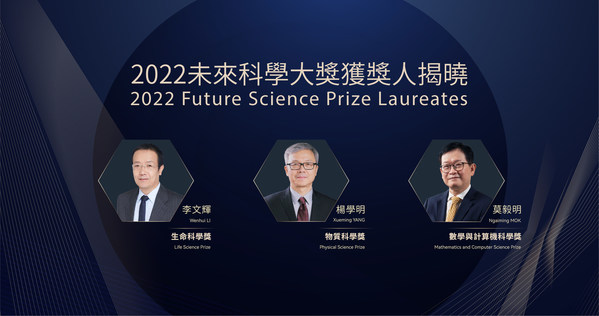Announcement of 2022 Future Science Prize Winners: Wenhui Li, Xueming Yang, Ngaiming Mok
BEIJING,Aug. 23,2022 --The Future Science Prize committee announces the winners of 2022 on August 21st. Prof. Wenhui Lireceives the Future Science Prize in life sciences for his discovery of the Hepatitis B and D virus receptor,sodium taurocholate cotransporting polypeptide (NTCP). This discovery facilitates the development of more effective treatment for hepatitis B and D.Prof. Xueming Yang receives the Future Science Prize in physical sciences for developing new-generation molecular beam techniques with high resolution and sensitivityfor state-resolved reaction dynamics studies,revealing quantum resonances and geometric phase effectsin chemical reactions. Prof. Ngaiming Mok receives the Future Science Prize in mathematics and computer science,for developing the theory of Varieties of Minimal Rational Tangents in algebraic geometry to solve several long-standing problems and proving Ax-Schanuel's conjecture for Shimura varieties.

Announcement of 2022 Future Science Prize Winners: Wenhui Li,Xueming Yang,Ngaiming Mok
2022 Future Science Prize - Life Science Prize
Wenhui Li
National Institute of Biological Sciences,Beijing,China
Tsinghua Institute of Multidisciplinary Biomedical Research
Citation: For his discovery of the Hepatitis B and D virus receptor,sodium taurocholate cotransporting polypeptide (NTCP). This discovery facilitates the development of more effective treatment for hepatitis B and D.
Hepatitis B virus (HBV) is a major health hazard with more than 250 million people currently infected globally. People infected with HBV have a high risk of developing cirrhosis and liver cancer. In 2012,Wenhui Li and his team discovered sodium taurocholate cotransporting polypeptide (NTCP) as a receptor for HBV and HDV infection. This is a milestone breakthrough in HBV research in the past three decades. His discovery uncovers a key molecular mechanism in HBV and HDV infection. This discovery facilitates the development of more effective treatment for hepatitis B and D.
Wenhui Li was born in Gansu,China in 1971 and received his Ph.D. from Peking Union Medical College & Chinese Academy of Medical Sciencesin 2001. During his postdoctoral research at Harvard Medical School,he revealed that severe acute respiratory syndrome-coronavirus (SARS-CoV) infects humans through angiotensin-converting enzyme 2 (ACE2) receptor in 2003. He is currently an investigator at the National Institute of Biological Sciences,China (NIBS) and a professor at the Tsinghua Institute of Multidisciplinary Biomedical Research.
2022 Future Science Prize - Physical Science Prize
Xueming Yang
Southern University of Science and Technology
DalianInstitute of Chemical Physics,Chinese Academy of Sciences
Citation: For developing new-generation molecular beam techniques with high resolution and sensitivityfor state-resolved reaction dynamics studies,revealing quantum resonances and geometric phase effectsin chemical reactions.
Since Eyring and Polanyi's seminal work on the transition state in chemical reactionsin the 1930s,the research of chemical dynamicshas achieved many scientific milestones,which were recognized by several Nobel Prizes.
Xueming Yang developed new-generation molecular beam instruments with high resolution and sensitivity.He achieved breakthrough results in reactive resonances,geometrical phase effects,and quantum interferences in chemical reactions. With the development of quantum state-specificbackward scattering spectroscopy,he revealed signatures of reaction resonances in a series of chemical reactions. In addition,he developed high-resolution crossed-beam reaction imaging techniques and observed the geometric phase effect and quantum interference between spin-orbit split partial wave resonances in a chemical reaction for the first time.
Yang's scientific research and his new-generation molecular beam instruments have provided powerful tools for unveiling the quantum nature of chemical reaction dynamics. His new discoveries have expanded the field of reaction dynamics to unprecedented depth and breadth.
Xueming Yang was born in Zhejiang,China in 1962 and received his Ph.D. from University of California atSanta Barbara in 1991. He is currently a professor at Southern University of Science and Technologyand a Research Fellow at Dalian Institute of Chemical Physics,Chinese Academy of Sciences.
2022 Future Science Prize - Mathematics and Computer Science Prize
Ngaiming Mok
The University of Hong Kong
Citation:
For developing the theory of Varieties of Minimal Rational Tangents in algebraic geometry to solve several long-standing problems and proving Ax-Schanuel's conjecture for Shimura varieties.
Complex differential geometry,a core field of modern mathematics,plays an important role in theoretical physics and many branches of mathematics. Ngaiming Mok made two fundamental contributions in this field and in other related fields. The first contribution is the theory of varieties of minimal rational tangents (VMRT) in algebraic geometry that he developed with Jun-Muk Hwang. The basic notion of VMRT was derived from Mok's earlier work in differential geometry and has been used to prove the Kähler rigidity of irreducible compact Hermitian symmetric spaces,as well as a conjecture of Lazarsfeld's,concerning holomorphic maps from rational homogeneous spaces onto projective manifolds.
The second contribution is his proof of Ax-Schanuel's conjecture for Shimura varieties jointly with Jonathan Pila and Jacob Tsimerman. The original Schanuel's conjecture is a major conjecture in number theory. The Ax-Schanuel Theorem on any Shimura variety is an important analogue of Schanuel's conjecture in hyperbolic geometry. The theorem of Mok et al. has become an important tool in arithmetic geometry.
Ngaiming Mok was born in Hong Kong,China in 1956 and received his Ph.D. from Stanford University in 1980. He is currently the Edmund and Peggy Tse Professor in Mathematics at the University of Hong Kong.
The Future Science Prize is a privately-funded science award initiated by a group of scientists and entrepreneurs. The Future Science Prize aims to celebrate the accomplishments of scientists who have made extraordinary scientific contributions. The laureates will be awarded for achievements that:
1. have made significant global impacts;
2. be original with long-term importance,or have passed the test of time; and
3. be completed mainly in the Mainland of China,Hong Kong,Macao,or Taiwan. There is no restriction on the nationalities of laureates.
There are three major categories at present,namely the "Life Science Prize",the "Physical Science Prize",and the "Mathematics and Computer Science Prize",with each award of 1 million US dollars respectively.
The Future Science Prize has been awarded to 27 laureates since 2016. All laureates are highly accomplished,widely recognized scientists whose research has made extraordinary impacts in life sciences,physical sciences,chemistry,mathematics,and computer science.
The 2022 Future Science Prize Week and the Award Ceremony will be held in November.

Announcement of 2022 Future Science Prize Winners: Wenhui Li,Ngaiming Mok